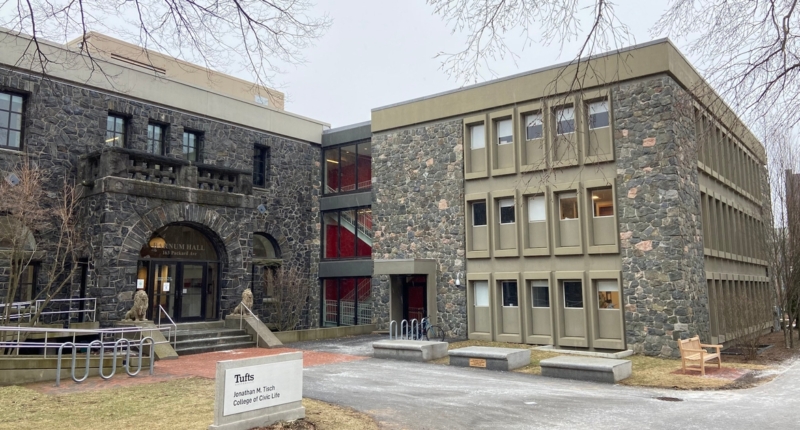During a virtual event hosted by the Jonathan M. Tisch College of Civic Life, speakers discussed bipartisanship and diversity in Massachusetts politics. Marcus Vaughn and Katherine Holahan shared their experiences and perspectives on bipartisanship and the importance of diverse opinions and perspectives in policymaking. The speakers emphasized the role of shared values and mutual respect in facilitating bipartisanship and the need for balance in the state government. They also discussed the intersection of identity and politics and the importance of recognizing the diversity of perspectives and experiences that shape individuals’ politics. The event aligns with Tisch College’s focus on citizen activism and comes at an important time for Massachusetts, given the recent change in the balance of power.
Tisch College Explores Bipartisanship in Massachusetts Politics
On March 14, the Jonathan M. Tisch College of Civic Life hosted a virtual event called “The Massachusetts Model: Bipartisanship on Beacon Hill.” The event, co-sponsored by the Political Science Department, Tufts ACTION, Tufts CIVIC, the Tufts Democrats, and the Tufts Republicans, aimed to explore the possibilities of bipartisanship in Massachusetts and national politics.
The event featured several speakers with unique experiences working in Massachusetts government, including Political Science Professor of the Practice Samuel Gebru, Massachusetts House of Representatives members Tackey Chan (D-Quincy) and Marcus Vaughn (R-Wrentham), Katherine Holahan, former deputy chief of staff for legislative affairs for Governor Charlie Baker, and former Lieutenant Governor of Massachusetts Karyn Polito.
The event’s theme of bipartisanship aligns with Tisch College’s focus on citizen activism for its spring speaker series. Tisch College Program Manager Jessica Byrnes said the theme was chosen because it is critical to progress, unique in Massachusetts, and the state recently experienced a significant transition.
At the event, participants discussed whether bipartisanship is possible and how partisanship plays out in Massachusetts. Chan pointed out that there is no monolith in political parties, and disagreements among party members are inevitable due to geography, constituencies, and different philosophies. Holahan added that bipartisanship is about diversity, meaning diversity of perspectives, experiences, and engagement. She believes that engagement of diverse people with diverse perspectives is crucial for bipartisanship to exist.
The conversation about bipartisanship is particularly relevant in Massachusetts because Democrats now control all three branches of state government following the inauguration of Governor Maura Healey. Byrnes wrote that exploring the impact of this transition on local issues is essential, as is understanding how it fits into an increasingly polarized national landscape.
Gebru said that the event aimed to answer the overarching question of whether bipartisanship is possible. He added that Massachusetts is home to the second-oldest democratic deliberative assembly in the world and the oldest continuously surviving democratic governing document.
In conclusion, the Tisch College event provided a platform for discussing the possibilities of bipartisanship in Massachusetts and national politics. The speakers emphasized the importance of diversity and engagement in achieving bipartisanship, and participants examined how partisanship plays out in Massachusetts. The event’s theme aligns with Tisch College’s focus on citizen activism, and it comes at an important time for Massachusetts, given the recent change in the balance of power.
Bipartisanship and Diversity in Massachusetts Politics
During a virtual event hosted by the Jonathan M. Tisch College of Civic Life, several speakers discussed the dynamics of bipartisanship in Massachusetts politics. Marcus Vaughn, a member of the Massachusetts House of Representatives, noted that bipartisanship has been facilitated by shared values and mutual respect. He cited the Affordable Care Act, the Wall Street Reform and Consumer Protection Act, and the American Rescue Plan Act as examples of key legislation passed with bipartisan support.
Katherine Holahan, former deputy chief of staff for legislative affairs for Governor Charlie Baker, discussed the importance of having a balance of power in the state government, even with a supermajority of Democrats controlling all three branches. She believes that having Republicans at the table ensures that diverse opinions are heard and considered. Holahan pointed to the passage of the police certification bill as an example of successful bipartisanship, as diverse opinions had to be taken into account due to the lack of a veto-proof Democratic majority.
The speakers also discussed the intersection of identity and politics. Vaughn, a Black Republican, emphasized that Black and brown people are not monolithic and that individuals from diverse backgrounds and experiences shape their politics.
Holahan reflected on the importance of bipartisanship in practice, not just in theory. She believes that key moments of bipartisanship illustrate the importance of diverse perspectives and experiences in policymaking.
Don’t miss interesting posts on Famousbio









